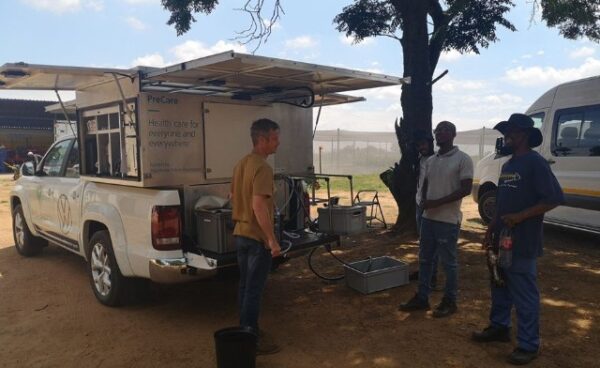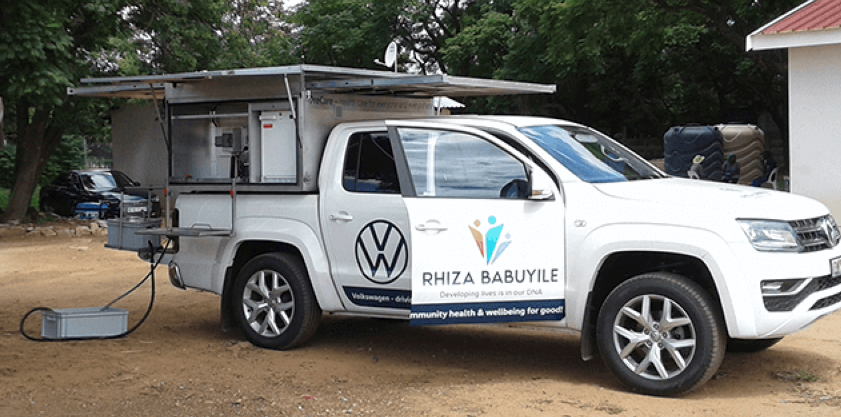South Africa-based S Mile Solutions is developing vehicle-integrated photovoltaic (VIPV) mobile systems built onto commercially available pickup trucks with mobile clinics as its first target market.
“The system is completely removable and can be adapted to fit on various pickup truck makes,” Martin Hamann, co-founder and networks manager at the Fraunhofer Innovation Platform for the Water-Energy-Food Nexus at Stellenbosch University told pv magazine.
The startup emerged from a project that involved Germany’s Fraunhofer Institute for Solar Energy Systems (Fraunhofer ISE), the Fraunhofer Institute of Surface Engineering and Thin Films (Fraunhofer IST) and Stellenbosch University in South Africa.
“The collaboration resulted in the development of a self-sufficient unit with integrated, modular and interchangeable components for the treatment and storage of water, generation and storage of electricity, onboard production and storage of disinfection, onboard cooling and telecommunications functionalities,” said Hamann.
The startup is building its second pickup truck-based prototype for deployment in the north of Namibia to provide primary healthcare services in rural areas. The latest design is a 1,650 W system based on 10 panels of flexible monocrystalline cells integrated into two PV frames. The arrays have a total weight of 75 kg and each frame has 5 panels, supplying about 825 W.
The fixed frame atop the vehicle plus the second pullout frame has a PV surface area measuring 8.4 m2 when deployed. The PV array can be deployed by one person in under 5 minutes, according to Hamann.
“The PV modules with integrated energy management system supply all the electricity required for maintaining a cold chain for vaccines, medicines and samples, as well as electricity for all other equipment required for off-grid and off-road primary healthcare service delivery,” said Hamann.
Besides electricity generation, other components for water treatment and storage, onboard disinfection, cooling and telecommunications can be integrated.
“The key enabling technology breakthrough is the smart integration of various infrastructure solutions into a small and elegant unit with a simple user interface. Great care was taken to improve the robustness of the design to better withstand the harsh conditions such as dust and temperature extremes in Africa,” explained Hamann, who added that the design “requires lower capital and operational costs” than a conventional mobile clinic.
S Mile Solutions’ prototype system was used by a healthcare NGO for almost a year in the Mpumalanga province in South Africa. The plan is to develop products for other applications that require a mobile and remote solution, such as tourism and environmental conservation. The S Mile products will be available for rent, lease or for purchase.
“Short-term requirements by the customer, such as providing immediate disaster relief or running a medical campaign, will favour a rental agreement,” said Hamann.
“Longer term needs, such as performing research in the field, could be a leasing agreement. Customers who want to provide permanent services, such as dedicated mobile clinics or field labs, will tend to purchase the unit.”

This content is protected by copyright and may not be reused. If you want to cooperate with us and would like to reuse some of our content, please contact: editors@pv-magazine.com.



By submitting this form you agree to pv magazine using your data for the purposes of publishing your comment.
Your personal data will only be disclosed or otherwise transmitted to third parties for the purposes of spam filtering or if this is necessary for technical maintenance of the website. Any other transfer to third parties will not take place unless this is justified on the basis of applicable data protection regulations or if pv magazine is legally obliged to do so.
You may revoke this consent at any time with effect for the future, in which case your personal data will be deleted immediately. Otherwise, your data will be deleted if pv magazine has processed your request or the purpose of data storage is fulfilled.
Further information on data privacy can be found in our Data Protection Policy.